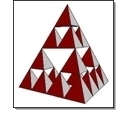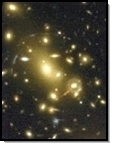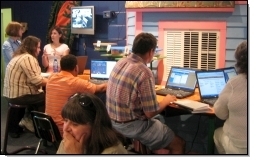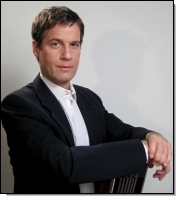 What is Fractal Geometry?
What is Fractal Geometry?
 About Fractal Music Workshops
About Fractal Music Workshops
 What People Have to Say
What People Have to Say
 About Harlan J. Brothers
About Harlan J. Brothers
What is Fractal Geometry?
 |
Fractal geometry is a new, fascinating, and surprisingly accessible field of mathematics. It became recognized, and instantly popular, with the 1982 publication of Benoit Mandelbrot's seminal work on the subject, The Fractal Geometry of Nature. The book gave mathematicians new and powerful tools for describing the rough, wiggly, and hitherto untamable shapes that permeate the natural world. It also described purely mathematical constructions that capture the eye, and defy the "common sense" of the more familiar Euclidean geometry. |
|
The fundamental characteristic of fractal geometry is scaling symmetry; the structure of a fractal object looks the same under magnification. This characteristic is often referred to as “scale invariance” or “self-similarity.” Self-similar objects are, in some specific sense, composed of smaller copies of themselves. |
 |
 |
The structure of objects ranging from bacterial colonies to galactic clusters bears witness to the ubiquity of fractal scaling. Not only does fractal geometry describe the shapes of trees, clouds, mountains, lightning, and river tributary systems, but it also gives rise to our very existence as human beings. Our vascular, respiratory, and nervous systems are all characterized by self-similar branching patterns. Scaling symmetry even turns up in the behavior of flood cycles, social networks, and financial markets. |
|
Perhaps it is a reflection of our fundamental nature that research has uncovered numerous examples of fractal structure in many areas of artistic endeavor. Scaling symmetry is known to arise in art, architecture, poetry, literature, and music. It is therefore not surprising that, increasingly, fractal geometry is the tool that mathematicians, physicists, biologists, and scientists of many other persuasions turn to for gaining a deeper understanding of the universe. |
 |
About Fractal Music Workshops

Using the tools of fractal geometry, Fractal Music Workshops offer teachers and students alike the opportunity to explore many of the intimate connections between mathematics and music. Focused presentations and hands-on exercises promote understanding in an
intuitive and entertaining manner.
Each workshop is tailored to meet the needs of the participants;
mathematicians can learn about music, musicians can learn about the
math inherent in their discipline, and everyone can gain a clearer understanding of the
fascinating field of fractals.
- Classical symmetry
- Scaling symmetry
- Natural fractals
- Power laws
- Physics of musical pitch
- Harmonic series
- Scales and intervals
- Music notation
- Prerequisites
- Common mistakes
- Duration scaling
- Pitch scaling
- Motivic scaling
- Structural scaling
 Fundamentals of Fractal Geometry
Fundamentals of Fractal Geometry
 Music Theory
Music Theory
 Fractal Analysis of Music
Fractal Analysis of Music
After
learning the necessary background, all participants have the
opportunity to compose their very own fractal music using the Fractal
Music Composer software designed for the Fractal Geometry
Workshop at Yale.
Full workshops run approximately 6 hours including a lunch break. Half-day labs and custom curricula can be designed to fit the needs of your department.
What People Have to Say
 |
“Harlan gets the
details right, gives a fine presentation of the big picture, and is
endlessly energetic and good-humored about the teaching and learning
process. He has the rare balance of skill in mathematics and
in music necessary to teach fractal music. Benoit, Nial, and
I all are very grateful that Harlan shared his talent with
us.”
|
 |
“Innovative, knowledgeable, creative, engaging, and witty - Harlan is sure to inform, challenge, and delight anyone with an interest in math, music, or technology. His passion for fractal music is contagious!”
|
 |
“Harlan was well
prepared and very flexible in meeting the needs of our
teachers. In a few hours time, he was able to teach music
theory, fractal basics, and how to use the Fractal Music Composer
software, and our teachers were creating their own fractal music
compositions. It was incredible!”
|
 |
“Harlan’s teaching style is open and engaging. With his understanding of fractals and music, he presented an outstanding workshop. Even with a limited knowledge of music, I found the workshop absolutely fascinating.”
|
 |
“The workshop on
fractals and music created by Harlan Brothers succeeds on several
levels. First, Harlan introduces the concept of fractals in a
clear and fascinating manner. Then, as the master teacher
that he is, he gives a succinct and engaging description of how
fractals can be discovered in musical compositions. The
software that he has developed allows even a musical novice to create a
fractal musical composition. I was excited and impressed to see how it became possible to appreciate and create fractal music.”
|
 |
“Harlan’s passion for mathematical challenges is evident in his teaching.”
|
 |
“I have participated in Fractal workshops at Yale where I interacted with Harlan and saw his delightful presentation on Fractal Music. Because of my own interest in music (as an amateur musician and through my symmetry course for non-science students) I can well appreciate Harlan's excellent understanding of music fundamentals, as well as his innovative work in developing the ideas of fractal music illustrated through his engaging audio-visual examples. I hope more people get a chance to attend his lectures.”
|
 |
“I loved it. Using
the Fractal Music Composer really allowed me to see the fractal nature
of the music. It was cool that I could create my own music
and understand the fractal mathematics behind it.”
|
About Harlan J. Brothers

Harlan Brothers is an inventor, musician, and mathematician. He serves as Director of Technology at The Country School in Madison, CT and is the founder of Brothers Technology, LLC. Brothers has received five U.S. patents and has published several research papers on one of the fundamental constants of nature, e. He is also an accomplished jazz guitarist and composer, having studied composition at the Berklee College of Music in Boston.
Over the course of six years, Brothers worked with Michael Frame and
Benoit Mandelbrot at the NSF funded Yale University Fractal Geometry
Workshops. The workshops served to train educators in the
subject of fractal geometry with the goal of developing fractal-based
mathematics curricula for students in middle school through college.
During an informal discussion in 2003 regarding the general lack of
understanding associated with the concept of fractal music, Mandelbrot suggested to
Brothers that he undertake a rigorous mathematical treatment of the subject. The
first result was a lecture and lab Brothers presented at the 2004 Fractal
Geometry Workshop at Yale. His most recent paper, entitled
"Structural Scaling in Bach’s Cello Suite No. 3," appeared in the
March 2007 issue of the World Scientific journal Fractals.
Contact Information:
 Harlan J. Brothers
Harlan J. BrothersBrothers Technology, LLC
PO Box 1016
Branford, CT 06405-8016
 harlan@brotherstechnology.com
harlan@brotherstechnology.comharlan@thecountryschool.org
 Work: (203) 421-3113 (ext. 165)
Work: (203) 421-3113 (ext. 165)Cell: (203) 589-6769
© 2004-2009 Harlan J. Brothers, All Rights Reserved.